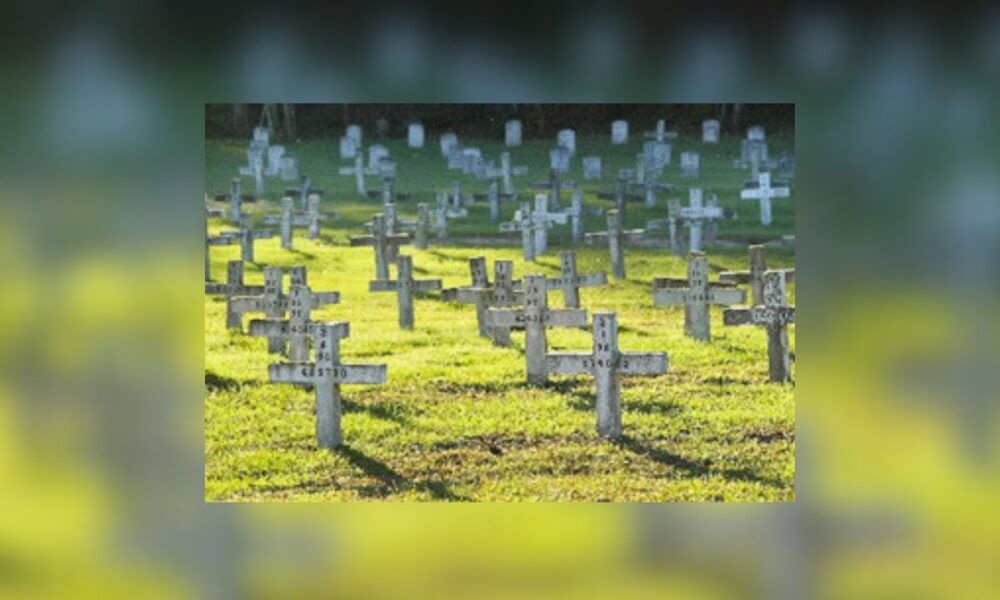The Captain Joe Byrd Cemetery in Huntsville, the largest prison graveyard in the United States, continues to grow quietly behind the Walls Unit.
Through a Texas Public Information Act request, The Dallas Express obtained the Texas Department of Criminal Justice’s (TDCJ) burial logs covering January 1, 2024, through mid-August 2025. The records show 199 inmates were buried in 2024 and 134 so far in 2025, bringing the total number of new graves to 333 in less than two years.
The new count marks the first detailed public update on Joe Byrd in more than a decade.
The last widely cited figure — approximately 3,000 burials — originated from criminologist Frank Wilson and was reported by outlets such as the Times-Mail, Texas Tribune, and Sam Houston State University in 2012. The new records suggest the total now exceeds 3,300, at the very least.
Across the two-year span, January saw the most burials (59), while September had the fewest (9).
The seasonal trend is clear: deaths peak in the winter months and slow in late summer.
A Cemetery With Deep Roots
The Times-Mail described Joe Byrd as the resting place for inmates “who died in prison and no one came forward to claim the body.”
Established in the 1850s, the cemetery occupies 22 acres donated to the state when Huntsville was still a frontier town, according to the Texas Prison Museum website.
For much of its history, the site was known among inmates as “Peckerwood Hill,” a reference to an older slang term for poverty. The land received its current name from an assistant warden who helped restore the cemetery after it had fallen into disrepair by the 1960s.
Today, a prison work crew maintains the property, mowing grass, carving headstones, and digging graves. Each white concrete marker bears an inmate’s name, number, and date of death. Some list only a number.
The state spends about $2,000 per burial, covering a simple casket and a brief service led by the prison chaplain, according to an article on Sam Houston State’s website.
Family can attend the funerals, but sometimes they reportedly lack the means. In these cases, fellow inmates may be among the only people who witness the decedent’s final resting place. “We’re the family for them,” one inmate worker told a criminal defense attorney website’s blog. “We’re the brother or the wife or the sister — whatever it may be.”
Executed Prisoners Rarely Buried Here
None of the inmates executed in Texas since January 2024 appears among the new burials. Though the Walls Unit houses the state’s death chamber, executed prisoners are almost always claimed by relatives or funeral homes.
Only about 2% of the graves at Joe Byrd belong to executed inmates, according to Sam Houston State University’s report. Headstones for those inmates reportedly typically bear an “X” or “EX,” or an ID number beginning with “999.” None of the entries in the new records include those marks.
James Smith, the funeral director for the TDCJ contract, said that he had only made arrangements for two executed inmates whose bodies weren’t claimed by their families, in an interview with the Texas Observer.
Most of those laid to rest at Joe Byrd reportedly died of illness, age, or natural causes within Texas’s roughly 100 prison units. Some are indigent. Others are estranged from families or have relatives who can’t afford a private burial.
The Thursday Ritual
For years, it has been tradition for burials to take place on Thursday mornings. The records obtained by DX indicate that every burial in the last two years has taken place on a Thursday except for eight, which were conducted on a Friday.
At the burial, the chaplain reads a short prayer, and inmates in white serve as pallbearers, according to the Texas Observer.
Updating the Record
The new data obtained by DX fills a decade-long gap in the public record.
Previous reporting had indicated that around 100 prisoners would be buried in Huntsville every year; this number now approximates 170 burials per year on average, based on the new records.
Frank Wilson, the criminologist who cataloged every headstone years ago, once called Joe Byrd “America’s common ground,” where “you have individuals that everyone in the world has something in common with,” per Sam Houston State.


